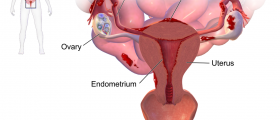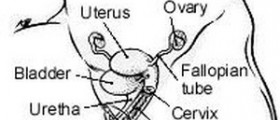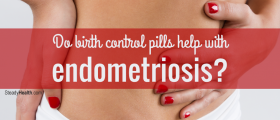
Endometriosis is a medical term used to describe growing of the endometrium (tissue which forms the lining of the uterus) in some other parts of the body, apart from the uterus. This condition is frequently found to affect the ovaries, lining of the pelvis or the bowels, but there are also cases when endometriosis affects other tissues, beyond the pelvic region.
What Causes Endometriosis?
Doctors commonly explain endometriosis by retrograde menstruation. This is the process when menstrual blood flows back through the fallopian tubes and further into the pelvic cavity, instead of going normally out from the body. As a result of retrograde menstruation, patient’s endometrial cells (from the menstrual blood) stick to the walls and organs in the pelvic cavity and grow there. Every time the patient has menstruation, every month, these displaced endometrial cells also start to bleed and cause different problems, such as irritation of surrounding tissue, scarring and adhesions.
Another possible explanation for endometriosis is transformation of the abdominal lining into endometrial cells. This is possible because cells of the abdominal lining can specialize and become endometrial tissue. However, no one knows what can provoke this change.
How to Recognize Endometriosis Symptoms?
Pelvic pain during menstrual period is one of the most commonly reported symptoms of endometriosis. Many women who do not have endometriosis suffer from menstrual cramping, but in this case the pain is far worse than just cramps and usually progresses over the years. Medical term for such pain is dysmenorrhea and it usually starts several days before and lasts during the entire menstruation. Patients usually locate endometriosis pain in the abdomen or in the lower part of their back. Excessive bleeding during menstruation (menorrhagia) or sometimes between two periods may also be indicative of endometriosis.
Women suffering from this problem may experience pain during urination and bowel movements, especially during menstruation. Some of them also complain about painful sexual intercourse or pain after sex. Additionally, endometriosis can be a cause of infertility, although these women may not have any prior problems associated with this condition.
Women suffering from endometriosis may additionally experience different problems during their periods, such as nausea, bloating, diarrhea/ constipation or fatigue in some cases.
However, there are women with pelvic pain who do not have endometriosis but instead are suffering from pelvic inflammatory disease (also known as PID), ovarian cysts or irritable bowel syndrome (IBS). In some patients endometriosis and IBS may be combined, complicating the diagnosis.
All in all, any chronic or severe pelvic pain should be reported to your doctor and thoroughly researched, in order to avoid any further pain and possible medical complications.

















Your thoughts on this
Loading...